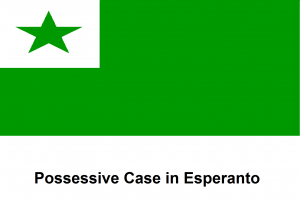Language/Esperanto/Grammar/Possessive-Case-in-Esperanto
Jump to navigation
Jump to search
Rate this lesson:
Hello everybody,
In today's lesson you will learn some useful vocabulary about ¨POSSESSIVE CASE¨ in Esperanto
Feel free to edit this page by adding new words and expressions !
Happy learning ! :)
After mastering this lesson, these related pages might interest you: Gender, Negation, Possessive pronouns & THE CORRELATIVES.
Possessive Case in Esperanto
| ENGLISH | ESPERANTO | ENGLISH PRONUNCIATION | PORTUGUESE |
| My ... (masc) / | Mia ... (masc) / | myah | Meu |
| My ... (femin) | Mia ... (femin) | myah | Minha |
| My ... (mas pl) | Mia ... (mas pl) | myah | Meus |
| My ... (femin pl) | Mia ... (femin pl) | myah | Minhas |
| Your ... (masc) | Via ... (masc) | vyah | Seu |
| Your ... (femin) | Via ... (femin) | vyah | Sua |
| Your ... (masc pl) | Via ... (masc pl) | vyah | Seus |
| Your ... (femin pl) | Via ... (femin pl) | vyah | Suas |
| His ... | Lia ... | lyah | ... dele |
| Her... | Ŝia... | shyah | ... dela |
| Our ... (masc) | Nia ... (masc) | nyah | Nosso |
| Our ... (femin) | Nia ... (femin) | nyah | Nossa |
| Our ... (masc pl) | Nia ... (masc pl) | nyah | Nossos |
| Our ... (femin pl) | Nia ... (femin pl) | nyah | Nossas |
| Your ... (polite) | Via ... (formal) | vyah | ... de vocês |
| Your ... (polite) | Via ... (formal) | vyah | ... de vocês |
| Their ... (m) | Ilia ... (masc) | ih lyah | ... deles |
| Their ... (f) | Ilia ... (femin) | ih lyah | ... delas |
Other Lessons
- Comaratives and Superlatives
- Verbs
- Gender
- Plural
- THE ACCUSATIVE
- Pronouns
- ADVERBS
- PREPOSITIONS
- CONJUNCTIONS

